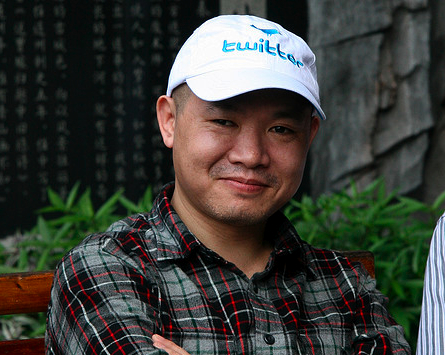In the midst of China’s continuing crackdown on activists and dissidents, prominent academic, activist and blogger Ran Yunfei (冉云飞) was detained on February 19 by police in his native Sichuan. Five days later, Ran was formally accused, family members say, of “subverting state power,” a charge that can carry heavy sentences. Earlier reports made through Twitter, but unverified, had said Ran had been accused of the even more serious crime of “inciting subversion of state power.”
A well-known and respected blogger, Ran Yunfei is also a signatory of the Charter 08 manifesto, a 2008 petition calling for democratic reforms in China. Ran is one of a number of important bloggers featured in CMP’s recent book China’s Bold Bloggers (中国猛博), compiled by Chinese investigative reporter Zhai Minglei (翟明磊) and edited by CMP directors Ying Chan (陈婉莹) and Qian Gang (钱钢).

[ABOVE: Ran Yunfei appears at the 2009 China Blogger Conference, photo taken by Rebecca MacKinnon and posted to Flickr.com.]
The following is a translation of a profile of Ran Yunfei published on August 10, 2010, in Guangdong’s Southern Metropolis Daily, an outspoken commercial newspaper that has recently come under a great deal of pressure from authorities in China. The profile was written by reporter Yu Shaolei (余少镭) and intern Wu Baolin (吴宝林).
Ran Yunfei (冉云飞)
An essayist, scholar, writer and Sichuan native. Graduated from the Chinese Studies department at Sichuan University in 1987. His books in Chinese include Intense Autumn: Rainer Maria Rilke (尖锐的秋天:里尔克) and Jorge Luis Borges: The Trapped Pioneer (陷阱里的先锋:博尔赫斯).
“I’m not the one you pine for”
If you go out for a bite to eat with Ran Yunfei, he’s apt to draw out some book or another and suggest you read a few pages to “take the edge off your hunger” while you’re waiting for the dishes to arrive. When he did this, I responded with an intense question posed in a playful tone: “If some day you lose your freedom, and you are told you can only take three books with you, which ones would you choose?” After thinking carefully, he said he would first take a dictionary, and second he would take something he hadn’t read (which of course had to be something hefty). Third, he would take along a classic, something he could pore over again and again, and “that way not feel lonesome.”
This is just the kind of bookworm he is, a self-styled “brigand” who refers to his personal library as a “reactionary abode.” . . .
Who could have guessed that this “reactionary abode” would be tucked away in the dormitory building of the Sichuan Provincial Literary Federation. I climb up to the eight floor, out of breath, and find myself blocked in on all sides by books. For a moment, I forget to breathe. There are so many books. And the space is so narrow. The principal collection of books is kept in two levels in a loft space fashioned next to the rooftop patio . . . and the books practically crash in on one’s head. These are all books he routinely peruses — special collections on religious studies, psychology, journalism and history. A series of bookshelves downstairs that resemble old wardrobes house his collection of classical works. On another side of his patio, he has built an archives room about eight square meters in area. Here are housed his files on popular and folk culture. I ask Ran Yunfei if he has ever attempted to count how many books he has in his collection. There are somewhere between 30 and 40 thousands books, he estimates. Some are stored away due to insufficient space.
[Hanging in the library] is a calligraphic couplet penned by the [nineteenth century painter] Ji Xiaolan (纪晓岚), which reads, “Books like mountains in chaos piled/lamps like red beans lovesick all the while.” Ran Yunfei explains that his wife dedicated this couplet to his “reactionary abode,” saying: “I’m not the one you pine for.”
Certainly, there is nothing on this earth Ran Yunfei “pines for” more than books. When it comes to collecting books, he regards himself as something of an expert. But he has had his moments of regret, or his bitter experiences you might say. It was around 2003 that he came across 20 volumes of The Posthumous Writings of Liu Shenshu (刘申叔先生遗书) in an old bookstore run by a friend, a very rare find, and inexpensive to boot. He decided to buy them, but hadn’t brought any cash along. He forgot to ask his friend to hold them, and by the time he returned they had already been sold to someone else.
Ran Yunfei has spent some twenty-odd years collecting books, ever since his college graduation. He knows every old book market in the country — and of course in Chengdu — like the back of his hand, much better than locals do. And he’ll collect collect any kind of book so long as he finds it worthwhile . . .
Ran Yunfei says he doesn’t collect books for their investment value but only in order to read them. He says his family was quite poor when he was growing up, and having books to read was something really special. For this reason, he says, he doesn’t have an peculiarities of taste, and he doesn’t follow crazes, reading what everyone else is raving about. He keeps on as always, reading and writing.
Each day, if he has no specific writing to do, Ran Yunfei will get up early and write on his blog. Then he’ll switch off his mobile phone and sit at home reading. If he has writing to do in the afternoon, he’ll often write straight through to nighttime. If he has social obligations he’ll go out, but otherwise he’ll stay at home reading, not bothering to go out. When engagements demand more of his time, he is careful to control himself, only going to those that are most necessary.
If there’s anything unusual about the way he reads books, it would have to be the way he enjoys his drink while he reads.
Of course I’m talking about beer. In the summers, when he drinks beer as he reads, he can often go through six or seven bottles at a sitting, perhaps ten bottles in a single day. And if he had to choose between books and beer, I ask? “Books, of course,” he says. “I could survive without beer, but being without books would be the end of me.”
Ran Yunfei’s writings are citizen’s writings. He blogs, commenting on current affairs. For twenty years he has written steadily, stopping for neither wind nor rain. He has never given a moment’s consideration to what can and cannot be written. Being an intellectual, he says, requires an extra measure of social responsibility.
Ran Yunfei’s acclaim and influence have come primarily online. He has been on the Internet since 1998, for 12 years now, and the Internet has changed and influenced him in major ways. He also uses the Internet, of course, as a way of offering his own feedback and changing society. He says: “It’s unacceptable for there to be no one who criticizes this society! If no one criticizes it, then this society will have an even greater deficit of morality and justice.” He confesses that his greatest interest still lies in research, particularly in academic scholarship and in a peaceful life among his books. “But when you sense the collective silence of our intellectuals, you begin to feel just how unacceptable it is . . . “
His rich collection of books is his “ammunition,” and they also help to ensure that his aim is true.
A phone call came in the midst of our conversation, and while I couldn’t understand the Sichuanese dialect, I could tell that Ran Yunfei was patiently listening to a meticulous story someone was telling on the other end. After about ten minutes he hung up the phone and I made bold to ask who it was. He said it was a farmer from Dujiangyan (都江堰) who had had his rights violated. A friend had referred him to [Ran Yunfei] for help.
“Does that happen a lot?” I asked.
It happened all the time, he said.
“How will you help him?”
“I’ll make an appeal through my weblog, but little can be done,” he said. “This kind of thing happens all the time. All we can do is apply a little bit of pressure.”





















